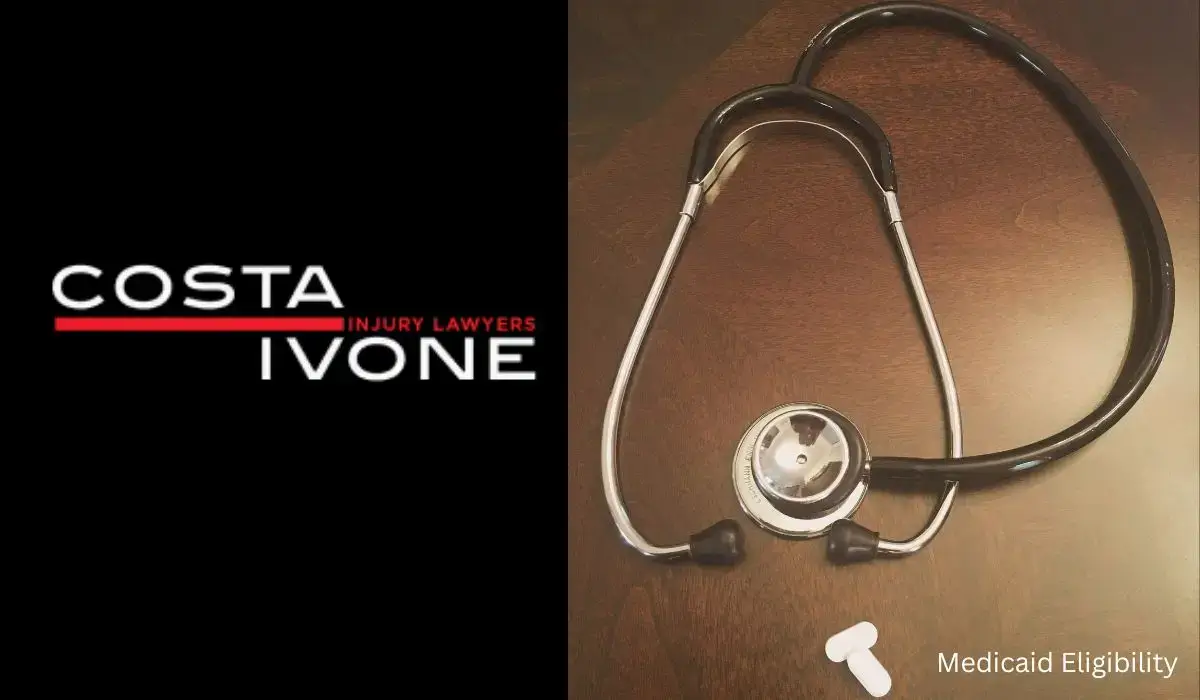Medicaid’s Claim On Your Settlement: Key Facts For Illinois Residents
When you receive a personal injury settlement, it’s reassuring to know that your medical bills and other expenses can be covered. However, if Medicaid has paid for any of your medical care, they are entitled to take a portion of your settlement to repay those costs. This process can significantly reduce the amount of money you actually receive, making it essential to understand how much Medicaid might take and what steps you can take to minimize their claim.
In this article, we’ll explain how much Medicaid will take from your settlement, how Medicaid determines its share of your settlement, the rules that apply in Illinois, and practical ways to protect more of your settlement. At Costa Ivone, our experienced personal injury lawyers in Chicago are here to guide you through this process, helping you understand your rights and ensuring you receive the maximum possible amount from your personal injury settlement.
What Is Medicaid And Who Is It For?
Medicaid is a healthcare program designed to provide essential medical coverage to millions of Americans, particularly those with limited income. The program is funded by both the federal government and individual states, leading to some variation in rules and eligibility criteria depending on where you live. In Illinois, Medicaid is available to residents who meet specific criteria related to income, residency, and personal circumstances.
To qualify for Medicaid in Illinois, you must meet the following criteria:
-
Residency:
You must be an Illinois resident to qualify, ensuring that Medicaid resources support those who live and contribute to the Illinois community.
-
Citizenship
Applicants must be U.S. nationals, citizens, permanent residents, or legal aliens. This requirement helps ensure that Medicaid supports those who are legally residing in the United States.
-
Income Level
Medicaid is intended for individuals and families with limited financial resources. To qualify, your income must fall below specific thresholds set by federal poverty guidelines, which are adjusted annually based on household size.
Some people might still qualify for Medicaid even if their income is a bit higher. For example, pregnant women, those responsible for young children, people with disabilities, and seniors over 65 often meet the requirements due to their healthcare needs.
Income Limits For Medicaid Eligibility
The amount of income you can earn while still qualifying for Medicaid in Illinois depends on the size of your household. Here’s a breakdown of the maximum income levels before taxes:
|
Household Size |
Maximum Income (Before Taxes) |
|
1 |
$20,783 |
|
2 |
$28,208 |
|
3 |
$35,632 |
|
4 |
$43,056 |
|
5 |
$50,481 |
|
6 |
$57,905 |
|
7 |
$65,330 |
| 8 |
$72,754 |
|
Each Additional Person |
Add $7,424 per person |
These limits are in place to ensure that Medicaid benefits are available to those who are most in need of financial support for healthcare.
How To Apply For Medicaid In Illinois?
Applying for Medicaid involves providing documentation to prove your eligibility. Here’s what you’ll need:
-
Proof Of Income
Recent pay stubs, tax returns, or other records showing your income.
-
Proof Of Residency
Documents like a utility bill or lease agreement that verify your Illinois residency.
-
Identification
A driver’s license, state ID, or passport to confirm your identity.
If you qualify, your coverage can start right away. Sometimes it can even cover medical expenses from up to three months before you applied. Consulting a Medicaid attorney can guide you through the application process, ensuring all documents are accurate and submitted correctly. They can also help if your application is denied and you need to appeal.
How A Personal Injury Settlement Affects Medicaid?
If you’re receiving Medicaid and are awarded a personal injury settlement, it’s important to understand how this might affect your eligibility. Medicaid is a needs-based program, so a significant settlement could push your income or assets above the allowable limits, potentially jeopardizing your benefits.
For example, if you receive a $100,000 settlement, it might disqualify you from Medicaid if it raises your income above the program’s thresholds. One way to protect your benefits is by setting up a Special Needs Trust, which can hold your settlement funds without them being counted as income. Consulting with an attorney is advisable to ensure your settlement is handled in a way that preserves your benefits.
How Much Can Medicaid Take From A Settlement In Illinois?
When Medicaid covers your medical expenses after an injury, they have the right to be reimbursed from any settlement you receive. The specific amount Medicaid can claim depends on what they paid for your care, but state laws in Illinois impose limits to ensure fairness.
For instance, imagine Medicaid paid $8,000 for your medical treatment following a bicycle accident, and you later receive a $40,000 settlement. Medicaid would typically look to recover the $8,000 they spent on your care.
Legal Limits On Medicaid’s Claim
Illinois has specific rules that cap the amount Medicaid and other healthcare providers can take from your settlement:
- Total Claim Limit
Under the Illinois Health Care Services Lien Act, no more than 40% of your settlement can be claimed by all healthcare providers combined, including Medicaid. This cap ensures that a substantial portion of your settlement remains with you, regardless of the total medical costs incurred.
- Individual Provider Limit
Each healthcare provider, including Medicaid, is limited to claiming no more than one-third of your settlement. This rule prevents any single provider from taking an excessive share of your compensation.
Consider a situation where you receive a $100,000 settlement, with Medicaid having covered $30,000 in medical expenses. Illinois law would cap the total claims from all providers at $40,000, with Medicaid’s individual claim capped at $33,333. Even if Medicaid’s actual expenses were higher, these limits protect a significant portion of your settlement.
This system ensures that while Medicaid is reimbursed for the care provided, you are still left with a fair amount to cover other damages and future needs.

Do You Have To Pay Back Medicaid In Illinois?
Yes, in Illinois, if Medicaid has paid for your medical care following an injury, you are required to repay them from any settlement you receive. This repayment is enforced through a Medicaid lien, which is placed on your settlement amount. The lien allows you to recover the funds it spent on your behalf, ensuring that the program is reimbursed when you receive compensation from the responsible party.
While Medicaid is entitled to repayment, legal frameworks are in place to prevent them from taking more than a fair share of your settlement. Working with a knowledgeable attorney can help you navigate this process and potentially reduce the amount Medicaid claims.
How Medicaid Determines What It Takes From Your Settlement?
When a settlement is awarded in a personal injury case, Medicaid reviews the amount it paid for your medical care related to the injury. This figure is the starting point for determining how much they will claim from your settlement. Here’s how the process works:
-
Calculating Medical Expenses
Medicaid will total the costs it covered for your medical treatment due to the injury. This amount forms the basis of their lien against your settlement.
-
Evaluating Settlement Breakdown
Medicaid’s claim is generally limited to the portion of your settlement allocated to medical expenses. Compensation for non-medical damages, like pain and suffering or lost wages, typically isn’t included in their claim.
-
Adjusting For Smaller Settlements
If the settlement is less than the total medical costs, Medicaid may agree to reduce its lien proportionately. This approach helps ensure fairness given the overall settlement amount.
Legal Considerations For Medicaid Liens
Medicaid’s right to claim a portion of your settlement is supported by both federal and state laws. Essentially, because Medicaid paid for your medical care, it has the right to be reimbursed if you receive compensation for those expenses.
In Illinois, Medicaid must follow specific steps to assert its lien:
-
Notification Of Lien
Medicaid is required to inform you and any other involved parties of its intent to claim a portion of your settlement. This notification will detail the total amount paid on your behalf and the amount they seek to recover.
-
Disputing The Lien
You have the opportunity to dispute Medicaid’s claim if you believe it includes incorrect amounts or unrelated expenses. This is where legal representation is particularly valuable.
-
Order Of Payments
Medicaid liens often take precedence over other claims against your settlement, meaning they must be settled first. However, state law ensures that a reasonable portion of your settlement remains intact after all claims are addressed.
Practical Ways To Reduce Medicaid’s Claim
While Medicaid has a right to reimbursement, there are strategies to reduce how much Medicaid will take from your settlement, allowing you to keep more of your settlement:
-
Detailed Record-Keeping
Maintain comprehensive records of all medical treatments, including those covered by Medicaid and any additional out-of-pocket expenses. This documentation is essential in verifying Medicaid’s claims and ensuring accuracy.
-
Allocating Settlement Funds Carefully
Work with your personal injury attorney to structure your settlement, clearly indicating the amounts allocated for different types of damages. Proper allocation can limit how much Medicaid can claim.
-
Proportional Reduction Negotiations
If your settlement doesn’t cover the total medical costs, your attorney can negotiate with Medicaid for a proportional reduction of the lien, ensuring it is fair relative to the settlement amount.
-
Challenging Inappropriate Charges
If Medicaid’s claim includes costs for treatments not related to your injury, these charges can be contested. For example, unrelated medical conditions should not be included in the lien.
-
Legal Negotiation
A skilled attorney can negotiate directly with Medicaid to reduce the lien. This might involve presenting evidence that some charges are excessive or that the settlement doesn’t adequately cover all damages.
How To Manage Medicaid And Medicare Liens?
If you’re covered by both Medicaid and Medicare, it’s important to understand that you may face liens from both programs after a personal injury settlement. While both Medicaid and Medicare seek reimbursement for the medical expenses they covered, they operate under different sets of rules. Understanding how these liens work and how to manage them is essential to protecting your settlement.
Medicare’s Role In Reimbursement
Like Medicaid, Medicare has the right to be reimbursed for any medical costs it covered that are related to your injury. This right is enforced under the Medicare Secondary Payer (MSP) rules, which mandate that Medicare be paid back before you receive the balance of your settlement. Failure to address Medicare’s lien can result in significant penalties, including interest charges. Additionally, Medicare’s claim may include conditional payments it made with the expectation of being repaid from your settlement.
Key Differences Between Medicaid And Medicare Liens
Understanding the differences between Medicaid and Medicare liens is crucial for managing them effectively:
- Lien Priority
Medicare liens typically take precedence over Medicaid liens. This means Medicare must be paid first before any remaining funds are used to satisfy Medicaid’s claims.
- Conditional Payments
Medicare often makes conditional payments for your treatment, expecting reimbursement once your settlement is finalized. Medicaid, however, usually does not operate on conditional payments.
- Statutory Timeframes
Medicare has specific timeframes within which they must be notified of the settlement, and failure to adhere to these deadlines can complicate the settlement process. Medicaid’s timeline may vary depending on state regulations.

Coordinating Medicaid And Medicare Liens
Handling both Medicaid and Medicare liens requires careful coordination because each program has its own requirements and processes for reimbursement. Effective management of these liens involves several critical steps:
- Identifying and Separating Claims
Your attorney must ensure that claims from Medicaid and Medicare are correctly identified and separated. This prevents overlap and ensures that each program only claims what it is legally entitled to.
- Reviewing the Accuracy of Claim
It’s essential to verify that the amounts claimed by both Medicaid and Medicare are accurate and directly related to your injury. Any discrepancies, such as charges for unrelated medical services, should be disputed to reduce the overall lien amount.
- Prioritizing Payments
Given the precedence of Medicare liens, your attorney will need to prioritize these payments before addressing Medicaid’s claims. In some cases, it may be possible to negotiate reduced payments if the total liens exceed your settlement amount.
- Negotiating Lien Reductions
Both Medicaid and Medicare may agree to reduce their liens if the settlement amount is insufficient to cover all expenses. Your attorney can negotiate on your behalf to achieve the most favorable outcome.
- Ensuring Compliance with Federal and State Laws
Each program operates under specific legal frameworks. It is critical to comply with all relevant federal and state laws to avoid penalties and ensure the settlement process goes smoothly.
The Role Of Legal Representation
Managing multiple liens while recovering from an injury can be overwhelming, but an experienced attorney can make a significant difference. Here’s how legal representation can help:
- Negotiate Reductions
Your attorney can work with both Medicaid and Medicare to negotiate a reduction in the lien amounts.
- Challenge Invalid Claims
If there are any inaccuracies in the claims made by Medicaid or Medicare, your attorney can dispute these.
- Ensure Compliance
Both Medicaid and Medicare have strict rules regarding the repayment of liens. An attorney will ensure that all legal requirements are met, avoiding delays or penalties that could impact your settlement.
What Are The Steps You Can Take To Protect Your Settlement?
If you’re concerned about the impact of Medicaid and Medicare liens on your settlement, taking proactive steps can help safeguard your financial interests:
Consult An Attorney Early
Getting legal advice as soon as possible allows you to plan how to structure your settlement in a way that minimizes the impact of these liens.
Know Your Rights
Understanding the laws governing Medicaid and Medicare liens in Illinois is crucial.
Explore All Options
Consider all legal strategies available to you, including negotiation, proportional reductions, and possibly setting up a trust, such as a Special Needs Trust.
Plan For Future Medical Needs
If you continue to rely on Medicaid or Medicare for ongoing care, your settlement should be structured to ensure that you remain eligible for these benefits.
Keep Detailed Records
Maintain thorough documentation of all medical expenses, including those covered by Medicaid and Medicare.
Protect Your Medicaid Settlement With The Right Personal Injury Lawyer
Understanding how Medicaid’s claim on your settlement works can make a big difference in how much of your money you get to keep. By learning about Medicaid’s calculations and knowing your options, you can better protect your settlement. Costa Ivone is committed to guiding you through this process and ensuring your rights are upheld every step of the way.
We have recovered over $100 million for our clients, with over $40 million secured in 2023 alone. Our accident injury lawyers, Anthony Ivone and Julio Costa, are recognized leaders, earning top accolades from 2015 to 2023. Our client-first approach is built on providing strong support, ethical service, and dedicated representation to ensure you get the justice you deserve.
We promise consistent communication, dedicated resources, and prompt updates on your case’s progress. With our contingency fee arrangement, you only pay if we win, ensuring that our focus is on your success. Contact us at (708) 816-2621 today for a FREE consultation and let us help you secure the settlement you deserve.





